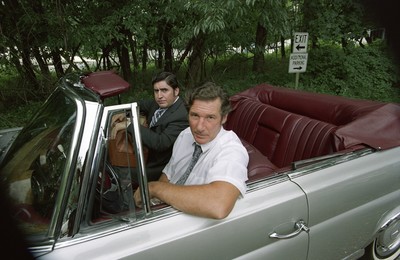“The Hoax”

As Mark Twain once observed, “Truth is our most valuable commodity, so let us economize.”
Clifford Irving took those words to heart — so much so that he almost pulled off the publishing scam of the century. The 20th century, that is.
Even so, he lived to tell the tale — although “The Hoax,” based on Irving’s book, fittingly plays fast and loose with the facts.
The phrase “fast and loose” also applies to director Lasse Hallstrom’s approach.
Some filmmakers might have used Irving’s daring 1971 deception — writing a bogus autobiography of the world’s most fascinating and eccentric recluse, Howard Hughes — as a cautionary tale, full of pride-goeth-before-a-fall miscues and shocking perfidy.
Hallstrom, however, treats Irving’s con as a comic kick in the pants, a rambunctious portrait of a delusional character who’s perfectly at home in a delusional time that bears more than a slight resemblance to our own.
For one thing, there’s a war going on, half a world away — in Vietnam. Back home, people are marching in the streets, while the president in the White House, Richard M. Nixon, is doing his best to ignore them.
Meanwhile, at McGraw-Hill publishing in New York, writer Clifford Irving (Richard Gere) is about to pull a fast one. (So is the movie, but more about that later.)
Editor Andrea Tate (a sharp, edgy Hope Davis) tries to break it to him gently, but there’s no getting around it: After an enthusiastic reception, McGraw-Hill doesn’t want his latest book after all.
OK, Irving reasons, I’ll give ’em one they do: “the book of the century.”
Exactly what that is, Irving hasn’t figured out. But with encouragement from his two co-conspirators — his artist wife Edith (Marcia Gay Harden, in deadpan hippie-dippy mode), who seems to have forgiven him for his affair with European baroness and wannabe actress Nina Van Pallandt (lovely, loopy Julie Delpy), and his pal Dick Suskind (ace sad-sack Alfred Molina), a research whiz and fellow writer — he hatches a doozy.
He’ll inform the McGraw-Hill suits that he’s been chosen by none other than Howard Hughes, the world’s most enigmatic billionaire, to collaborate on his memoirs.
They’re skeptical, of course. But not quite skeptical enough to turn down what’s sure to be the biggest blockbuster book of all time.
Thus begins an ever-escalating roundelay of exaggeration, deception — and self-deception.
As Irving reasons, “a man who says something completely implausible will always be believed.”
With the loyal Suskind as his researcher and partner in crime, Irving concocts bogus letters from “Howard.” The dynamic duo head to Las Vegas (played by stock footage of Bob Stupak’s long-gone Vegas World and location work in Indio, Calif., near Palm Springs) to interview longtime Hughes associate Noah Dietrich (Eli Wallach) — and surreptitiously photocopy his unpublished memoirs of life in Hughes’ inner circle.
Irving even conducts tape-recorded interviews with “Howard,” mimicking his subject’s seldom-heard voice — and drawing on a Hughes-like, pencil-thin moustache to get into character — as he recounts his adventures as aviator, business tycoon and movie mogul. Clearly, Irving’s losing his grip. Or maybe he’s just caught up in the anything-goes — including the truth — spirit of the times.
In adapting Irving’s book, screenwriter William Wheeler takes more than a few liberties with the facts. After all, why let them get in the way of a good story? That’s a reasonable argument for most of the changes, but the big one involves Irving’s desperation to publish something, anything. In real life, he had a four-book deal with McGraw-Hill — and signaled his predilection for con artistry with his first book, which focused on a notorious art forger and bore the portentous title “Fake!”
That pivotal shift gives the movie’s Irving a motivation he didn’t have in real life. Yet it also signals the benign, tacitly approving attitude “The Hoax” displays toward its slippery protagonist.
Every now and again, that breezy tone seems a bit troubling. Most of the time, however, “The Hoax” takes its cues from Irving himself — and, as a result, is too busy keeping all the plates spinning to worry about such niceties as moral absolutes.
“The Hoax” also deftly interweaves its themes of dishonesty and betrayal, so that the characters’ personal lives reflect the wider, eve-of-Watergate political world — and vice versa.
In Hallstrom’s hands, the movie bounces from gripping thriller to rollicking farce and back again, as Irving and Co. struggle to keep their colossal fraud from blowing up in their faces.
In theory, we shouldn’t care about any of these people, from the ambitious publishing executives (exemplified by the expressive Davis and Stanley Tucci as her meticulous, greedy boss) to Irving himself.
Gere is predictably at home playing yet another charming smoothie, but adds a deft touch of desperate vulnerability to make Clifford Irving’s bravado as poignant as it is brazen.
As Twain would say (and did), “It ain’t what you don’t know that gets you into trouble. It’s what you know for sure that just ain’t so.” In the case of “The Hoax,” truer words were never spoken.